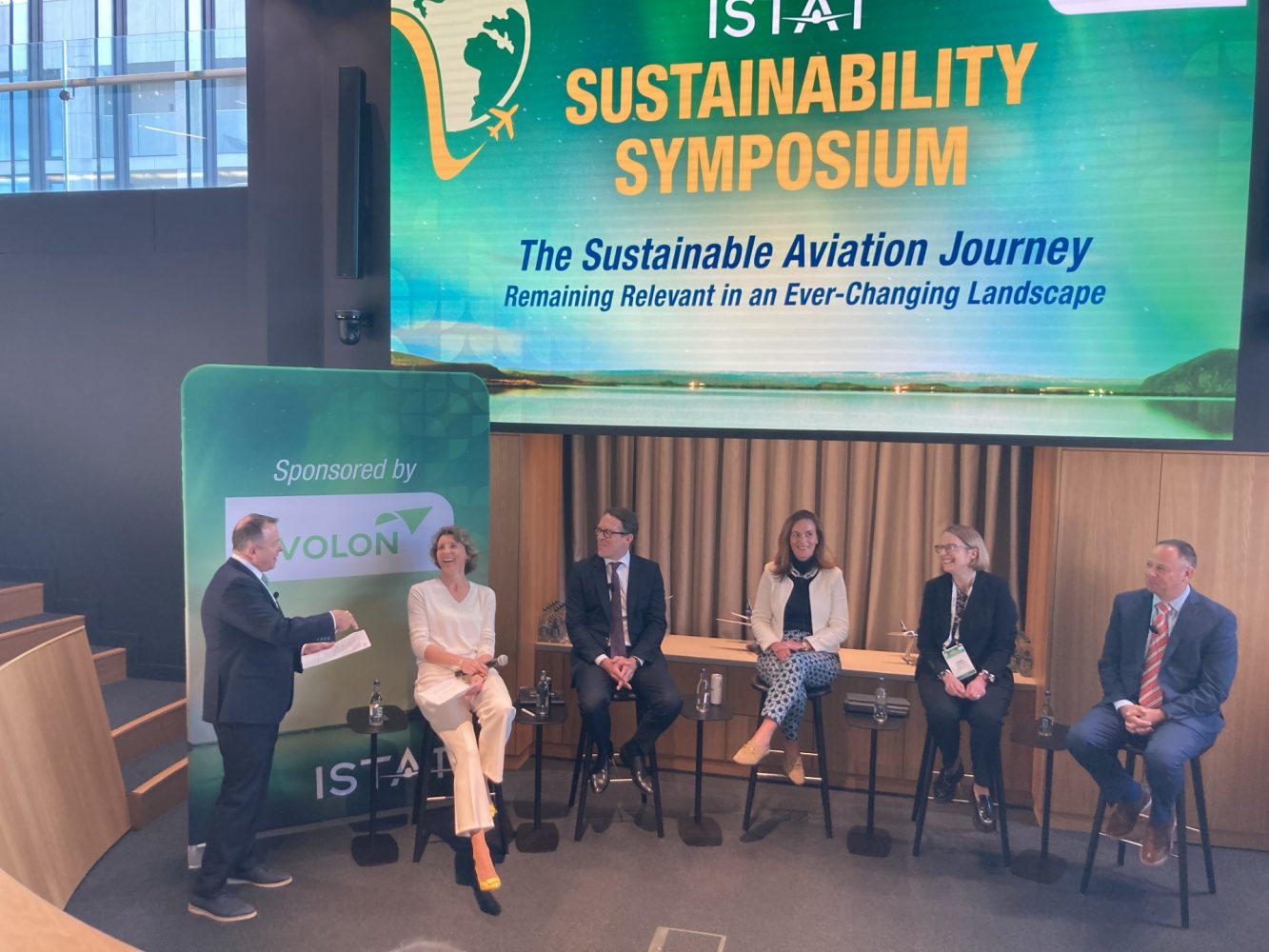From transition to delivery: Lahiru Ranasinghe on steering easyJet’s decarbonization effort
impact sat down with Lahiru Ranasinghe, easyJet’s recently-promoted Director of Sustainability, who shared how the airline is shifting gear — from long-term planning to delivering tangible progress on its path toward Net Zero. Having led the development of easyJet’s Net Zero strategy, Lahiru now oversees delivery across all sustainability fronts — from flight operations and engineering to ground activities. The airlines’ aim is to build internal capabilities to progressively reduce its’ environmental impact.
🌍 With aircraft delivery delays still impacting the sector, easyJet continues to prioritize fuel-saving operational efficiencies across Europe, one of the world’s most complex airspace environments. But there’s a limit to what airlines can do alone — airspace modernization across Europe is essential to unlock 10% emissions reductions industry-wide.
🚀 Scaling SAF and Supporting Innovation
easyJet is actively meeting SAF mandates across its 30+ European bases, while also pushing for progress on eSAF policy as part of Project SkyPower. Long-term, the airline sees hydrogen as the only viable route to truly zero-carbon flight for its short-haul network — and is backing its development accordingly.
📉 Tracking emissions reduction
The airline uses emissions intensity (CO2 per RTK) as its main progress metric. easyJet also closely monitors peers’ sustainability efforts to benchmark its own, but sees the journey to Net Zero as an industry-wide challenge that requires collective progress.
💬 “We cannot afford to be one of the few heavy emitters left in the world when we get into the 2040s and 2050s,” Lahiru notes. “There’s a lot at stake.”
Stay tuned to read the whole article in impact’s “Insights 2025” to be published on July 14!

News
Tag Archives: Aircraft
impact webinar “Heading to Net Zero: Re-routing aviation’s technology transition?”
Can commercial aviation realistically develop and adopt the new technologies crucial to achieving Net Zero by 2050? This questions was addressed during impact’s first webinar on June 12, hosted by ISTAT as one of its Learning Lab sessions.
Aviation stands at a critical juncture in its decarbonization journey. The path to Net Zero will be shaped by technology — but what’s truly possible over the next 15 years? The expert round, moderated by Michael Halaby (MUFG), featured Jonathon Counsell (IAG), Sandrine Lacorre (CFM International), Dan Rutherford (ICCT) and Julian Renz (ZeroAvia) for a lively discussion on topics including
🔍 What’s a realistic trajectory for aviation’s technology shift?
🛩️ How big a step can Airbus and Boeing take by 2035?
🔥 Can gas-turbine innovation still surprise us?
🚀 Is a new tech player capable of launching a mainline airliner by the late 2030s?
📉 What are the risks of inaction vs early-mover advantage?
🐉 Could China emerge as a disruptive force in global aviation?
You missed it? Watch the full webinar here: https://youtu.be/FECc-7tNI2c?si=9Sqbq9CtUiAvUOcN
impact speaks to… Amy Ruddock, SVP Sustainable Aviation & Corporate Development at Willis Lease Finance Corporation
How can lessors align SAF with their leasing interests? SAF is essential to aviation’s path to decarbonisation – but supply isn’t scaling fast enough. Lessors can help change that.
In a recent interview, Eduardo Mariz, Senior Analyst & Sustainability Lead at Ishka, and Dr. Ulrike Ziegler, Managing Director of impact, spoke to Dr. Amy Ruddock, SVP of Sustainable Aviation at Willis Lease Finance Corporation (WLFC) about how lessors can play a bigger role in making SAF commercially viable. WLFC is leading by example, currently investing in a 14,000-ton-per-year SAF facility in the UK through Willis Sustainable Fuels.
The company’s first SAF production facility will be located near Teesside International Airport, where the UK plans to build its first SAF handling waterside terminal. WLFC’s facility will use Carbonshift FlexFeed – an innovative technology that is ultimately designed to produce power-to-liquid (PtL) fuel but can flexibly use bio-methane or green hydrogen as its input.
Among the key reasons for WLFC’s decision to invest in SAF production in the UK are:
1. Long-Term Industry Commitment:
WLFC sees sustainable aviation as critical to its long-term success and competitiveness
2. Favourable Regulatory Environment:
UK policies, including SAF mandates, revenue certainty mechanisms, and carbon reduction targets, provide market clarity and support investment
Why should lessors engage in SAF?
🔸 Helping de-risk SAF financing – Integrating SAF certificates into lease contracts could unlock bankable offtake agreements, a major hurdle for SAF developers
🔸 Gaining a competitive edge – Lessors acting as SAF offtakers can offer airlines better access, particularly in regions with limited supply
🔸 Adapting to an evolving aviation landscape – Expanding their role beyond leasing allows lessors to align with industry sustainability demands and regulatory shifts
What’s in it for lessors?
✅ Future-proof their business as sustainability regulations tighten
✅ A growing multi-billion-dollar market with rising demand
✅ Stronger airline partnerships by supporting decarbonisation goals
As Amy highlights: “Any investment in lowering carbon is a commercial investment too – it’s an investment in the future of the industry.”
📣 Want to learn more about WLFC’s SAF investment? Stay tuned for our IMPACT Insights 2025 report – coming soon!
impact partnered with ISTAT for the Sustainability Symposium 2025!
We had the pleasure to collaborate with ISTAT for their fourth Sustainability Symposium on April 29, hosted by Avolon in Dublin.
The day began with opening remarks from Bryson P. Monteleone, ISTAT and impact Board member and Andy Cronin, followed by a compelling keynote from Brian Moran, who introduced CASCADE—Boeing’s forecasting tool on emission reduction—and emphasized the critical role of the energy sector in scaling SAF production.
🏆 GA Telesis was honored with the ISTAT Sustainability Award for its bold SAF goals and alignment with the UN SDGs.
Here some highlights from the panel discussions:
🏛️ Policy Challenges in Sustainable Aviation:
Moderated by Paul Sheridan, Donal Handley and Thomas Fowler examined regulatory complexities, including the EU Omnibus proposal, EU Taxonomy, and the SAF mandate. The discussion called for better regulatory alignment and tailored approaches, and considered the role of EU ETS funds in scaling SAF.
📊 Macroeconomic Trends & Aircraft Values:
Led by Jim Morrison, expert speakers Richard Evans, Ben Chapman, and Stephen Rooney focused on robust air travel demand despite economic uncertainty, supply chain impacts on fleet renewal, and how macroeconomic forces influence sustainability investments. Topics also included climate risks like fuel price volatility and residual value concerns.
🛫 Interactive Discussion: Financing Future Technologies:
Marc Tembleque Vilalta moderated a session with Sandrine Lacorre and Hal Calamvokis exploring engine innovation, including CFM International’s RISE program for fuel and emissions reduction. The discussion also covered green hydrogen development and public acceptance of emerging engine designs.
🔋 SAF & Aircraft Technology Innovations:
Moderated by Michael Rurik Halaby, FRAeS, Daniel Da Silva, Julien Manhes, and Ivor van Dartel showcased next-generation aircraft concepts—from JetZero’s aerodynamic efficiencies to VÆRIDION’s electric regional aircraft. Airbus emphasized the importance of SAF feedstock clarity, demand stimulation, and robust offsetting frameworks.
💵 Strategies for Sustainability-Linked Loans & Leases:
Dr. Ulrike Ziegler 🇺🇦, Chairwoman of the Board of impact, led a discussion with Jean Chedeville, Kaiori Creed, Emma Giddings, and Gordon Grant on the rising significance of sustainability- and transition-linked finance, emphasizing the need for transparent metrics, regulatory consistency, and solutions to bridge the SAF financing gap.
The ISTAT Sustainability Symposium 2025 underscored the immense challenges ahead but also highlighted the unwavering commitment and innovative spirit driving the decarbonization of the aviation industry. It was an exceptional day of learning, connecting, and a renewed sense of purpose in navigating this complex but crucial journey.

